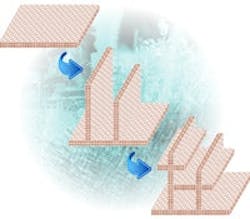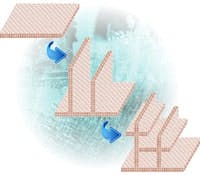Angled Nanosheets Speed Catalysis
Arranging ultra-thin catalytic zeolite nanosheets at 90-degree angles allows chemicals faster access to the catalysts, says an international team led by researchers at the University of Minnesota, Minneapolis. Moreover, such catalysts are more selective and stable than conventional ones, they note. The catalysts potentially could improve production economics for methanol-to-gasoline conversion as well as other chemical and biofuel processes that rely on zeolite catalysts.
A unique process encourages the highly optimized nanosheets to grow at 90-degree angles (see Figure 1). More details appear in an article in a recent issue of Science.
NOVEL NANOSHEET
Figure 1. A unique process encourages growth of ultra-thin zeolite nanosheets at 90-degree angles. Source: Michael Tsapatsis, University of Minnesota."Our catalyst technology enables the introduction of mesopores in microporous zeolites without additional processing costs. Catalytic processes using common zeolite catalysts, like ZSM-5, which are affected by diffusion limitations are likely to benefit from it," says lead researcher Michael Tsapatsis, a chemical engineering and materials science professor in the University's College of Science and Engineering.He also notes that self-pillared pentasil zeolite catalyst may have potential in applications beyond petrochemical processing and the team is already investigating these catalysts in reactions involved in the production of chemicals and fuels from biomass.This research builds upon the university's previous work on ultra-thin zeolite nanosheets used as specialized molecular sieves for production of both renewable and fossil-based fuels and chemicals (see, "Nanosheets Promise Energy-Efficient Separations"). The new catalyst reportedly can be made at the same, or possiby lower, cost than current ones. While long-term stability tests have yet to be performed, Tsapatsis, expects greater resistance to deactivation by coke formation, and better robustness. The next step is to test the catalyst in methanol-to-gasoline conversions and as an additive for fluid catalytic cracking. "We expect to start tests by the end of this year. Tailoring of the catalysts will be required including use of additives, binders, etc.," says Tsapatsis.Scaling up the catalyst for industrial use should be straightforward, says Tsapatsis. Argilex Technologies, a Minnesota start-up company that has licensed the technology, will optimize the catalyst for specific applications and is working on consumer testing."This breakthrough can have a major impact on both the conversion of natural gas to higher-value chemicals and fuels, and on bio- and petroleum refiners," says Cesar Gonzalez, CEO of Argilex Technologies. "Using catalysts made by this novel approach, refiners will be able to obtain a higher yield of desirable products such as gasoline, diesel, ethylene and propylene. At Argilex, we envision this catalyst technology platform to become a key contributor to efficient use of natural resources and improved economics of the world's largest industries."'We have the option of either producing the catalyst commercially or licensing it. We are in conversations with strategic partners to determine what is best for the company," he adds.
